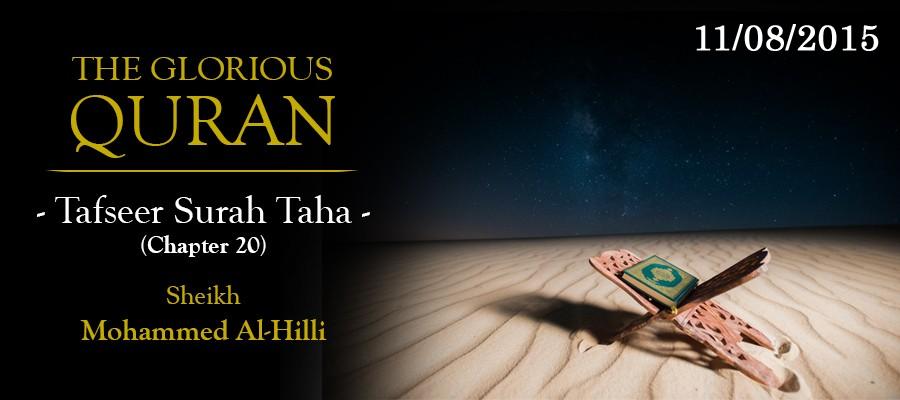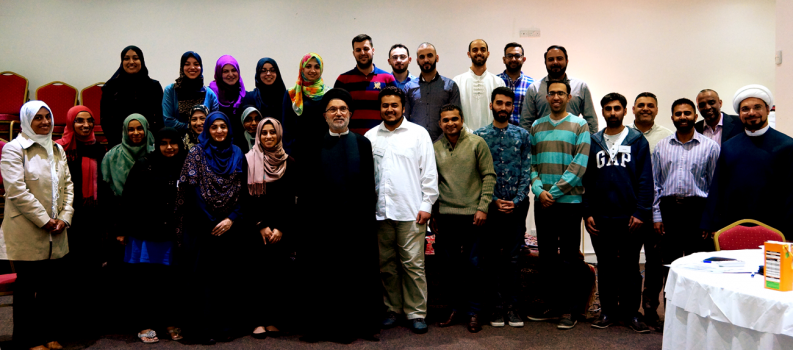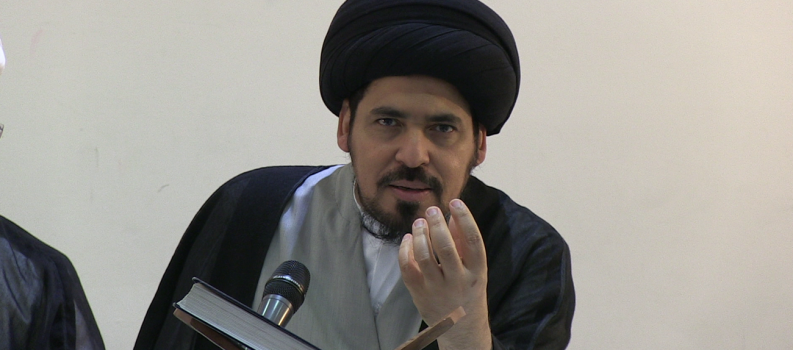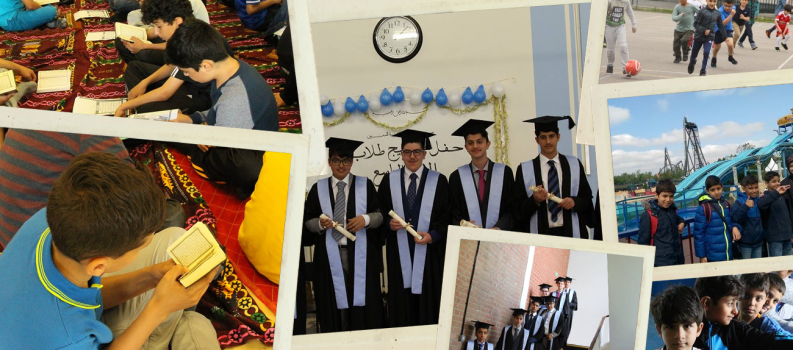
Shaykh Mohammed al-Hilli continued his weekly tafsīr, picking up from where he left off last week on verse 44 of Sūrat Ṭā Hā and continuing on to verse 47.
Shaykh Mohammed began by asking us to imagine that each of us was an ambassador tasked with confronting the most vicious tyrant in the world and entreating him not only to change for the better, but also to give up that which he cherishes most, a portion of his power. With what kind of mentality would we approach such a task? In all likelihood we would go in with all guns blazing, resorting to threats and confrontational language.
Bearing this in mind, Shaykh Mohammed went on to give a brief recap of the conversation between God and the Prophet Moses, as narrated in Sūrat Ṭā Hā, so far. It begins with God introducing himself to Moses, telling him to remove his sandals since he is in the sanctified valley of Ṭuwā, and establishing Himself as the sole deity in existence, saying “lā ‘ilāha ‘illā ‘anā – there is no god apart from Me” (20:14). Then God shows Moses two signs: He tells Moses to throw his staff down and it turns into a snake, and He tells Moses to draw his hand to his side, which emerges glowing white. These signs having been given, God commands Moses to confront Pharaoh “‘innahu ṭaġā – for he has transgressed” (20:24), but before going Moses asks for four things: patience and steadfastness; an easing in accomplishing his mission; eloquence; and a partner in his task in the form of his brother Aaron. God grants him his requests, and recalls to Moses the favour He has already bestowed upon him. Following this he commands Moses again, along with Aaron, to confront Pharaoh, instructing them to approach him with “qawlan layyinā – gentle speech” (20:44).
This is a pivotal point in the narrative. We remember how we imagined ourselves as ambassadors to a ruthless tyrant and how we would be predisposed to be aggressive with him. Here Moses and Aaron are ambassadors of God to Pharaoh, the greatest tyrant of his time, and they are instructed to use gentle speech with him. This epitomises not just the attitude Islam instructs us to take when we’re dealing with tyrants and despots, clear violators of basic human morality, but also more generally with people we don’t like or with whom we disagree. This is substantiated throughout the Qur’an. For example, in Sūrat al-Naḥl we are commanded thus: “id`u ilā sabīli rabbika bil-ḥikmati wal-maw`iẓati al-ḥasanah – call people to your Lord’s way with wisdom and with good counsel” (16:125). In Sūrat al-Furqān we are told that “`ibādu al-raḥmāni alleδīna yamšūna `ala al-‘arḍi hawnan wa’iδā xāṭabahum al-jāhilūna qālū salāmā – the servants of the Merciful are those who gently walk upon the land and when the ignorant confront them they say: ‘Peace’” (25:63). These verses exemplify the importance of tolerance in Islam, and by ‘tolerance’ we don’t mean accepting anything which is said, but dealing with those with whom we disagree in a peaceful and non-judgemental fashion.
Unfortunately we live in a world rife with intolerance, and we’ve seen it grow in scale over the last twenty years or so. A recent survey by YouGov asked a large sample of British people what words they most associated with the term “Muslim” and the most common word given was “terrorist” or “terrorism”. In America the Pew Research Center asked people to rate how warmly they felt towards different religious groups, giving them a score from 0-100. Jews received an average rating of 63, Christians an average of 62, whilst Muslims only managed an average of 40. There is a strong impression in the modern world that Islam is a religion of intolerance, and it’s up to us to combat this idea and demonstrate the contrary. It’s very easy for us to blame the media, who often chase sensationalism instead of balance, or the terrorists who have appropriated our religion to their own ends, but in the end of the day, playing the blame game is not going to change any opinions. It’s all very well for us to say that Islam is a religion of peace and tolerance (this phrase has been rolled out so many time it’s become a cliché), but we need to substantiate this with evidence and exegesis from the Qur’an.
In addition to the verse we’ve already seen, we can look at Sūrat al-Jāθiyah in which God says: “qul lillaδīna ‘āmanū yaġfirū lillaδīna la yarjūna ‘ayyāma allah – tell those who believe to forgive those who do not anticipate God’s days” (45:14). “God’s days” are generally understood to mean spectacular days on which God’s presence will be felt by everyone, such as the Day of Judgement, or the Last Day, or the day of the reappearance of Imam Mehdi (a). Those who do not anticipate those days are clearly non-believers, and here we are entreated to forgive them. Similarly in Sūrat al-Zuxruf God tells us of those who do not believe: “faṣfaḥ `anhum waqul salām – so forgive them and say: ‘Peace’” (43:89). Even the very first narration we are given in Sūrat al-Baqarah, concerning the creation of Adam, demonstrates God’s tolerance. When God proclaims that He will create mankind on Earth the angels question Him, saying: “‘ataj`alu fīhā man yufsidu fīhā wayasfiku al-dimā’ – will you make on it someone who will cause corruption and shed blood?” (2:30). God does not smite them in retribution for questioning His intentions, however, but simply says: “‘a`lamu mā lā ta`lamūn – I know that which you don’t know” (2:30) and subsequently demonstrates His superiority by giving Adam knowledge that the angels don’t have. This echoes the sentiment expressed later on in Sūrat al-Baqara to those who claim that only Jews and Christians will enter Paradise: “hātū burhānakum ‘in kuntum ṣādiqīn – present your evidence if you are truthful” (2:111).
Throughout the Qur’an, then, there are countless examples of how to deal with those with whom you disagree, and this with soft words, peaceful engagement and discussion concerning evidence. Certainly, to return to Sūrat Ṭā Hā, this is the spirit with which Moses and Aaron are charged with confronting Pharaoh. But what is the reason for this? If we return to verse 44 we find that God says: “la`allahu yataδakkaru ‘aw yaxšā – so that he [Pharaoh] may remember or become God-wary” (20:44). This phrase requires a little unpacking. First, the word “la`allah – so that he may” implies a certain degree of uncertainty and some scholars have asked whether this undermines God’s omniscience. If God is all-knowing surely He would know what Pharaoh will do, so why would He use a phrase here that implies uncertainty? The answer is, of course, free will. Though there is no doubt that God knows what the outcome of the affair will be, from the perspective of human beings such as Moses and Aaron, to whom God is speaking, the future is still undecided. God knows what will happen, but he doesn’t compel it to happen – Pharaoh’s fate remains in his own hands; he can either choose to be guided or continue to transgress. A similar sentiment can be found in Sūrat al-A`rāf when a certain group of Israelites are committing wrong and those who continue to preach are asked: “lima ta`iẓūna qawman allāhu muhlikuhum ‘aw mu`aδδibuhum `aδāban šadīdā – why do you warn a people whom God will destroy or punish with a powerful punishment?” (7:164). They reply by saying: “ma`δiratan ‘ilā rabbikum wala`allahum yattaqūn – to be absolved before your Lord and so that they may become pious” (7:164). Just because some people will not listen to God’s guidance and are bound to continue doing wrong, and God knows that this is the case, doesn’t mean they shouldn’t be presented with the opportunity to amend their ways. They always have the ability to change – whether they choose to do it or not is up to them. This is one way of explaining the use of the word “la`allah” in verse 44 Sūrat Ṭā Hā, but another way is to think of the gentle speech with which Moses and Aaron are ordered to approach Pharaoh as only a prerequisite to deliverance. It’s not a question of direct causal relationship, insomuch as the gentle speech will directly cause Pharaoh to change his ways (as indeed it doesn’t), but it is the beginning of a path which could lead to Pharaoh’s deliverance if, of course, Pharaoh chooses to follow it. This sense of the preposition “la`alla-” finds its correlation again in Sūrat al-A`rāf when God tells us: “wa’iδā quri’a al-qur’ānu fastami`ū lahu wa’anṣitū la`allakum turḥamūn – and when the Qur’an is recited listen to it and pay attention so that you may receive mercy” (7:204). In this instance listening to the Qur’an is not presented as a panacea for all spiritual ills; it’s not the case that if you listen to the Qur’an who will automatically receive mercy. Rather it’s presented as the beginning of the path that leads to mercy, and continuing along that path depends on our own resolve and our willingness to apply the Qur’an’s teachings in our lives. Similarly Moses’s and Aaron’s gentle speech is just the beginning – the rest is up to Pharaoh. Nevertheless there is a direct correlative relationship between the use of soft words and the promoting of humility and God-wariness.
So, having investigated the word “la`allah” let us move on to the next words: “yataδakkar ‘aw yaxšā – he remember(s) or become(s) God-wary”. What is it that God is implying that Pharaoh might remember here, since no explicit object is given? To answer this question we have to go back to the first three verses of this chapter: “ṭā hā | mā ‘anzalnā `alayka al-qur’āna litašqā | ‘illa taδkiratan liman yaxšā – Ṭā Hā | we have not sent down the Qur’an for you to be distressed | but only as a reminder for those who are God-wary.” (20:1-3). Here the Qur’an itself is presented as something which reminds, and there is again a connection between remembering and God-wariness. The Qur’an has one espoused purpose: to guide mankind, as it is described in Sūrat al-Baqarah: “hudan lil-muttaqīn – a guide for the pious” (2:2). Thus this act of reminding must be the same as the act of guiding, and as such we can interpret it as being a reminder of an original and basic state of being; that is to say the fiṭrah, or basic moral instinct, that we all have. The act of remembering takes us back to the state of infancy, for in Islam we believe that every new child is born sinless, submissive to God and God-wary. However, as we grow and become exposed to the evils of the world we can stray from the correct path and have to make an effort to remember, and try and recover, that original state. How this is achieved is by attaining knowledge, as God tells us in Sūrat al-Fāṭir: “‘innamā yaxša allaha min `ibādihi al-`ulamā’ – those from God’s servants who fear him are those who have knowledge” (35:28). So, Moses and Aaron are tasked with reminding Pharaoh of his basic moral instincts and, as we shall shortly see, that his is only a mortal human being.
So, with Moses’s and Aaron’s task before them we are told that: “qālā rabbanā ‘innanā naxāfu ‘an yafruṭa `alayna ‘aw ‘an yaṭġā – they said: ‘Our Lord, we are afraid that he will hasten against us or that he will transgress’” (20:45). The first question to ask here is: who is speaking? The use of the dual form of the verb “qālā – they (two) said” implies that it is both Moses and Aaron speaking. However, things are not so simple as that. This conversation is still taking place between God and Moses in the valley of Ṭuwā and there is no indication that Aaron was ever present there with him. Furthermore, Moses is granted the epithet Kalīm Allah, meaning the one who speaks with God, for his unique privilege of having conversed directly with God through the Burning Bush. Aaron, though a prophet like Moses, was accorded no such privilege. The interpretation of the exegetes is that the dual form of the verb is used to convey the fact that both Moses and Aaron shared the same sentiment, and not that they were both present before the valley of Ṭuwā.
The next question to ask is: why are these two prophets afraid of Pharaoh’s retaliation? In Sūrat al-‘Aḥzāb God tells us that “alleδīna yuballiġūna risālāti allahi wayaxšawnahu walā yaxšawna ‘aḥadan ‘illā allah – those who deliver God’s message and fear Him fear no one other than God” (33:39). So how can it be that Moses and Aaron are expressing fear of Pharaoh? We have to look more closely at the words to understand. The first point to make is the use of the word “‘aw – or” to divide the phrase into two. They don’t say “we are afraid that he will hasten upon us and transgress”, they say “or transgress”. It implies that they are afraid of two different things: either that Pharaoh will hasten against them, or that he will transgress. We should also point out that the verb used here describing Pharaoh’s transgression is “ṭaġā”, the same verb that God used before when describing Pharaoh’s actions in general. As such, the transgression they fear is not against themselves, but against the Israelites in general. They are afraid of two possible consequences should they confront Pharaoh. The first is that Pharaoh will hasten against them, in the sense that he will hasten to silence them, probably by killing them, thus leaving them unable to complete God’s task. The second is that he will be angered by their words and take out his anger on the Israelites, submitting them to even more oppression than they have already been suffering. Moses and Aaron are not expressing fear for themselves. God assuages their fears by telling them: “lā taxāfā innanī ma`akumā ‘asma`u wa’arā – don’t fear, I am with you, I hear and I see” (20:46). Some have asked why God uses two verbs to describe Himself, saying both that he hears and that he sees. Of course, God is all-seeing and all-hearing, but the particular use of two verbs here resonates with the two fears that Moses and Aaron have expressed, and thus has the effect of diminishing each of them.
Following this God commands them: “fa’tiyāh – come to him [Pharaoh]” (20:47). It’s important to note here that three times before now God has commanded either Moses alone, or Moses and Aaron, to go to Pharaoh using the verb “δahab – to go”. Each time they put questions to God or asked for things to help in the task. But now there is nothing more to ask, and so the verb “‘atā – to come” is used, implying a greater sense of proximity both to Pharaoh and the task in hand. The phrase “come to Pharaoh” rather than “go to Pharaoh” also implies a gentler approach, in accordance with the gentle speech they have been commanded to use with Pharaoh. Having dispatched them thus, God tells them what to say: “‘innā rasūlā rabbika farsil ma`anā banī ‘isrā’īla walā tu`aδδibhum – we are messengers of your Lord, so send the Israelites with us and don’t torment them” (20:47). The first thing we notice is that they call themselves “messengers of your Lord”, not “of our Lord”. This has the effect of reminding Pharaoh that he is a mortal man and not, as he often styled himself, a god. It also constitutes inclusive language, bringing Pharaoh closer to Moses and Aaron on a common ground for discussion. Rather than exhorting him in the name of God whom they worship and he doesn’t, they come in the name of the One Lord who is the Lord of Pharaoh and of Moses and of Aaron and of all things in Heaven and on Earth. And the first thing they ask Pharaoh to do is not to submit to God, but to stop persecuting the Israelites. Here we see the importance the Qur’an accredits to the saving of innocent blood. The are some ‘Muslims’ (and here we must use the term sarcastically) who take certain verses of the Qur’an (or indeed, parts of verses) out of context, and use them to justify their own bloodthirsty agendas, but there can be no doubt that the overwhelming message of the Qur’an is one that totally abhors the shedding of even one drop of innocent blood. Though Moses and Aaron are prophets of God, and as such are committed to guiding people to God’s path, their very first priority is to put an end to persecution and bloodshed.
Moses and Aaron are prepared to back up their claims of prophethood with a miracle, saying: “qad ji’nāka bi’āyatin min rabbik – we have come to you with a sign from your Lord” (20:47). We may ask why they refer only to one miracle when we know that God was already shown two to Moses, and promised him more to come? Exegetes have answered this question by suggesting that one miracle should be enough to prove that they have been sent by God, since a miracle is by definition something which cannot be reproduced by human beings. Later on, by God’s mercy, more may (and will) be provided, but for the time being one is sufficient to prove the point. Having referred to their sign, Moses and Aaron go on to say: “wal-salāmu `alā man ittaba`a al-hudā – and peace be upon the one who follows guidance” (20:47). Again, and we cannot stress this enough, we see the tolerant attitude with which they approach Pharaoh. They don’t say: “follow our guidance or we’ll kill you”, but come in the name of peace, using inclusive language, and offering proofs. Their primary concern is to save lives; after that Pharaoh can be guided if he wishes, since the person who is guided will have peace, but the choice is left to him.
This attitude reminds us most of our 6th Imam, Imam Ja’far al-Sadiq (a), whose epithet means “the truthful one”. We recall now that verse from Sūrat al-Baqarah extolling those who are truthful to bring forth their evidence. Imam al-Sadiq certainly did that. We have countless narrations telling us of how he would debate for hours with those who disagreed with him, people from all creeds, from atheists to Muslims. He never resorted to aggression or intimidation, always calmly putting forward his arguments and proofs; and when his opponents got to a point where they just couldn’t agree, the debate would simply stop and they would be free to return and argue another day. Such was Imam al-Sadiq’s renown for pursuing and disseminating truth that now most of the Islamic world is indebted to his teachings, since Abu Hanifa and Malik ibn Anas (founders of the Hanafi and Maliki Sunni schools) were students of Imam al-Sadiq. As with him, and with Moses, our job is not to judge others or compel them to follow our beliefs, but only to espouse what we believe with humility and tolerance.
Next week insha’allah we will continue to look at the conversation with Pharaoh in Sūrat Ṭā Hā.








